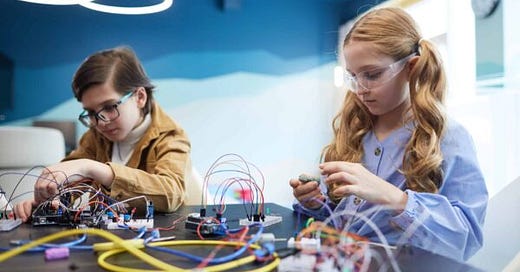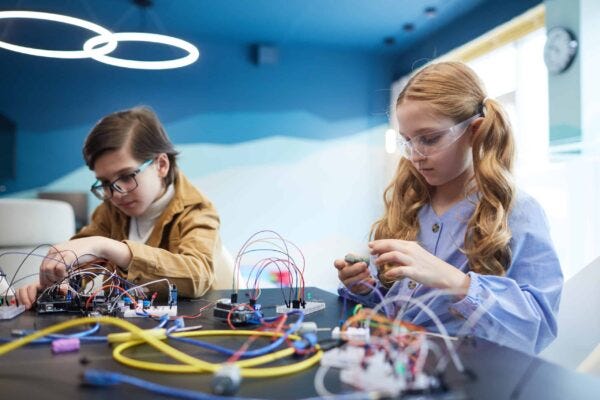18th century Prussia faced many challenges during the Napoleonic wars. Much of their land was taken and it became apparent to the King of Prussia, Frederick the Great, that something had to change.
At that time, children were educated by parents, churches and private tutors. To ensure military success, it was essential to create a literate but obedient future workforce, destined to become soldiers.
A mandatory school system was born to promote a respect for authority and a sense of duty towards the Nation.
Some of the main characteristics of this revolutionary system were:
Compulsory schools funded by taxes.
Prescribed national curriculum.
Age segregation.
Lack of freedom and little opportunity for independent thinking.
Frequent national tests to ensure all learning outcomes were met.
Deep respect for discipline and authority (teachers).
Little to no chance to develop a new passion or skill outside of the curriculum.
Restrictions in movement (by sitting and focusing on current task).
Dropping everything at the sound of the bell.
Strict teacher training system.
Sounds familiar?
This new system, successful at the time, soon became very popular and was adopted by many countries across Europe, America, and Asia.
This marked the beginning of the public school system we now know.
Fast forward to the 21st century, it is estimated that 2/3rd of children will have jobs that do not yet exist. Technology plays an important part of our lives and psychologists point to the evidence that our brain is wired differently than previous generations. For example, the frequent use of video games may increase reaction times, problem solving skills and spatial intelligence.
Our workplace, socio-economic and political situation has also drastically changed since the 18th and 19th centuries. Top CEOs and employers admit that soft skills like initiative, curiosity, collaboration, critical thinking and a love of learning are crucial to thrive in this new era.
Despite that, School has broadly remained the same.
So what 21st century skills should we teach children then?
In 2020, the World Economic Forum listed the top 10 skills workers will need in 2025. These 10 skills were added to 4 different categories: problem solving skills, self-management, working with people, technology use and development.
Similarly, The World Health Organization identified 10 basic life skills we should have to thrive in life. They include:
Decision Making and Problem solving
Creative thinking and Critical thinking
Self-awareness and Empathy
Communication and Interpersonal skills
Good management of emotions and stress
Both organisations recognised that that these skills had to be developed at School.
To help us go through each of these skills in a more organised fashion, we will use the 7 “QI” skills (pronounced “key”) paediatrician and educator Dr Laura Jana, created.
Me skills or (Intrapersonal skills):
Intrapersonal skills represent the relationship with the inner self. They help us better understand ourselves, control our emotions and behaviour and find strategies to cope with daily personal challenges. Skills in this category include (but not only):
Self-awareness,
Self-management,
Self-discipline,
Self-discovery,
Self-esteem,
Autonomy,
Introspection and more.
I believe a strong self-awareness is the foundation of a successful life. Without it, anything we build-up on top cannot be stable enough.
We skills (or Interpersonal skills):
Interpersonal skills represent our relationship with the rest of the world. They help us better understand others, build and maintain strong relationships and work together towards a common goal. Skills in this category include (but not only):
Social skills,
Collaboration,
Team work,
Communication,
Compassion,
Leadership,
Negotiation,
Tolerance,
Public speaking and more.
Why skills (or Thinking skills):
Thinking skills are what makes us free thinkers, capable of analysing different scenarios and taking initiative to solve meaningful problems. Skills in this category include (but not only):
Critical thinking,
Problem solving skills,
Curiosity,
Analytical thinking,
Asking good questions,
Humility and more.
What if skills (or Creative skills):
Creative skills are closely tied to thinking skills. We first need to dissect, analyse and understand a problem before coming up with a potential solution. Creativity allows us to think outside the box, generate new ideas and imagine what an ideal future could look like.
Skills in this category include (but not only):
Creativity,
Innovation,
Imagination,
Lateral thinking skills.
“What if” approach,
Future oriented perspective and more.
Wiggle skills (or Action-oriented skills)
Wiggle skills are described as a mental restlessness. They are what push us to take action, get out of our comfort zone and never settle. Without wiggle skills, we wouldn’t be able to try new things and take risks to achieve our goals. Skills in this category include (but not only):
Action oriented perspective,
Initiative,
Boldness,
Can-do attitude,
Open-mindedness and more.
Will skills (or Persistence):
Will skills are what makes us set goals and work hard to achieve them. They represent what keeps us going despite the many challenges we face. Skills in this category include (but not only):
Intrinsic motivation,
Drive,
Persistence,
Dedication,
Purpose,
Ambition and more.
Wobble skills (or Adaptability):
Wobble skills represent our ability to bounce back and keep going. They are closely tied to will skills and help us adapt to new environments, challenges and social situations. Skills in this category include (but not only):
Adaptability,
Flexibility,
Patience,
Resilience,
Growth Mindset and more.
Now if we analyse our current traditional school system, we note that:
Not questioning the teacher does NOT promote critical thinking.
Being given too many instructions, does NOT promote problem solving skills.
Adopting a pass or fail approach for assessments does NOT promote intrinsic motivation and a growth mindset.
Being told to stay quiet and sit down does NOT promote social skills and collaboration.
Being asked to only follow the curriculum does NOT promote self-discovery, curiosity and creativity.
Many alternative schools have now adopted a Start-up style that mimics modern workplaces with laptops and other technologies available. There, you will also find open spaces that promote inclusion and collaboration, various kinds of tools for children to use, some quiet spaces for more focused work, project-based learning, brainstorming sessions, and the freedom to walk around the room and move from work station to work station.
This design takes into account the development of the 21st century skills we covered.
I am not saying that every child should score high on every skill mentioned earlier. Everyone is different. And as we will see in future articles, it is important to find what makes us special on an individual level. This is why school should adopt a self-discovery and skill based approach instead on focusing on academic content only.
Our children represent the next generation of problem solvers. They are the ones who will run our society, raise the future generations and fix the problems of tomorrow.
School is preparing children for a life that no longer exists.
It is time that we change the status quo to create a happier and more fulfilled generation.
If you want to be part of that change, start by sharing this article with someone you think needs to read this.
Icon: Smart city icons created by Graphiqa - Flaticon






I couldn’t agree more with you !
Ever since I’ve been out of school I constantly ask myself what can I do ? What are my skills ? Cause we’re not allowed to discover that in school, we only have to be present and to learn things that are not important in day to day life or to develop our personalities and then when you get out of this cycle you’re just lost in who you are and that I think is the saddest part 😢
Un très bel article qui m'a fait froid dans le dos (le début). Quelle manipulation de masse cette éducation! C'est très triste pour les enfants et il faut que cela s'arrête!